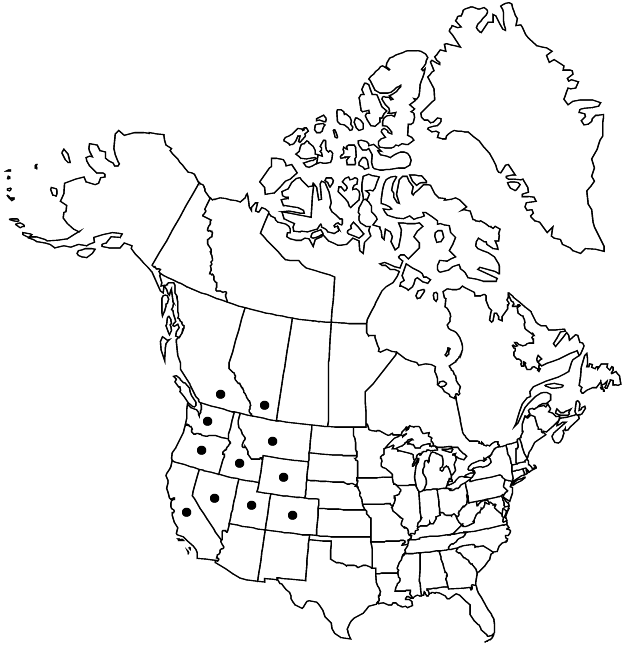Difference between revisions of "Minuartia nuttallii"
Annuaire Conserv. Jard. Bot. Genève 13–14: 385. 1911.
FNA>Volume Importer |
FNA>Volume Importer |
||
| Line 28: | Line 28: | ||
|distribution=w North America. | |distribution=w North America. | ||
|discussion=<p>Varieties 4 (4 in the flora).</p><!-- | |discussion=<p>Varieties 4 (4 in the flora).</p><!-- | ||
| − | --><p>Minuartia nuttallii, M. decumbens, M. rosei, and M. stolonifera form a complex that, together with the eastern species M. caroliniana and M. michauxii, comprise sect. Sclerophylla Mattfeld. The four western species all have capsules that contain one to three(?) large (1.5–2.8 mm) seeds; unfortunately, these plants appear to be collected only rarely in fruit.</p><!-- | + | --><p><i>Minuartia nuttallii</i>, <i>M. decumbens</i>, <i>M. rosei</i>, and <i>M. stolonifera</i> form a complex that, together with the eastern species <i>M. caroliniana</i> and <i>M. michauxii</i>, comprise sect. Sclerophylla Mattfeld. The four western species all have capsules that contain one to three(?) large (1.5–2.8 mm) seeds; unfortunately, these plants appear to be collected only rarely in fruit.</p><!-- |
| − | --><p>Minuartia nuttallii includes four varieties, which can, for the most part, be easily recognized. There is some overlap between var. gracilis and var. fragilis in western Nevada and southeastern Oregon, where some plants exhibit prominently arcuate-spreading leaves (as in var. fragilis) and weakly veined sepals (as in var. gracilis).</p> | + | --><p><i>Minuartia nuttallii</i> includes four varieties, which can, for the most part, be easily recognized. There is some overlap between <i></i>var.<i> gracilis</i> and <i></i>var.<i> fragilis</i> in western <i>Nevada</i> and southeastern Oregon, where some plants exhibit prominently arcuate-spreading leaves (as in <i></i>var.<i> fragilis</i>) and weakly veined sepals (as in <i></i>var.<i> gracilis</i>).</p> |
|tables= | |tables= | ||
|references= | |references= | ||
| Line 80: | Line 80: | ||
|publication year=1911 | |publication year=1911 | ||
|special status= | |special status= | ||
| − | |source xml=https://jpend@bitbucket.org/aafc-mbb/fna-data-curation.git/src/ | + | |source xml=https://jpend@bitbucket.org/aafc-mbb/fna-data-curation.git/src/8f726806613d60c220dc4493de13607dd3150896/coarse_grained_fna_xml/V5/V5_264.xml |
|subfamily=Caryophyllaceae subfam. Alsinoideae | |subfamily=Caryophyllaceae subfam. Alsinoideae | ||
|genus=Minuartia | |genus=Minuartia | ||
Revision as of 17:37, 18 September 2019
Plants perennial, mat-forming. Taproots thickened, woody; crown, many-branched, woody; rhizomes and trailing stems to 60 cm. Stems ascending to erect, ± green, 2–20 cm, densely glandular-hairy throughout, internodes of flowering stems 0.2–2 times as long as leaves. Leaves tightly appressed to spreading, ± evenly spaced, connate proximally, with ± loose, scarious sheath 0.1–0.7 mm; blade straight to recurved, ± green, flat, prominently 1-veined abaxially, broadly lanceolate to linear, 5–20 × 0.5–1.5 mm, ± rigid, margins rounded, scarious in proximal 1/3–1/4, apex green to purple, acute to acuminate or spinescent, navicular with small mucro or spinescent, dull, stipitate-glandular; axillary leaves present proximally to throughout. Inflorescences (3–)6–30-flowered, open cymes; bracts lanceolate to subulate, usually scarious. Pedicels 0.2–2 cm, stipitate-glandular. Flowers: hypanthium disc-shaped; sepals 1–3-veined, narrowly lanceolate to lanceolate or ovate (herbaceous portion narrowly lanceolate to lanceolate or ovate), 3–6(–7) mm, not enlarging in fruit, apex often purple, acute to acuminate or spinescent, not hooded, stipitate-glandular; petals obovate, 0.5–1.6 times as long as sepals, apex rounded, entire. Capsules on stipe ca. 0.1–0.2 mm, ovoid, 5 mm, usually shorter than sepals. Seeds reddish brown to dark brown, oblong-elliptic with hilar notch on 1 end, 1.5–2.7 mm, tuberculate; tubercles low-rounded.
Distribution

w North America.
Discussion
Varieties 4 (4 in the flora).
Minuartia nuttallii, M. decumbens, M. rosei, and M. stolonifera form a complex that, together with the eastern species M. caroliniana and M. michauxii, comprise sect. Sclerophylla Mattfeld. The four western species all have capsules that contain one to three(?) large (1.5–2.8 mm) seeds; unfortunately, these plants appear to be collected only rarely in fruit.
Minuartia nuttallii includes four varieties, which can, for the most part, be easily recognized. There is some overlap between var. gracilis and var. fragilis in western Nevada and southeastern Oregon, where some plants exhibit prominently arcuate-spreading leaves (as in var. fragilis) and weakly veined sepals (as in var. gracilis).
Selected References
None.
Lower Taxa
Key
| 1 | Leaf blade apices spinecent; sepal apices spinescent | > 2 |
| 1 | Leaf blade apices acute to acuminate, somewhat navicular; sepal apices acuminate | > 3 |
| 2 | Leaves prominently arcuate-spreading, blade 10-20 mm; sepals (1-)3-veined | Minuartia nuttallii var. fragilis |
| 2 | Leaves appressed to occasionally arcuate- spreading, blade 5-7 mm; sepals 1(-3)-veined | Minuartia nuttallii var. gracilis |
| 3 | Sepals lanceolate to narrowly so; petals 0.5-1.2 times as long as sepals | Minuartia nuttallii var. nuttallii |
| 3 | Sepals ovate to lanceolate; petals 1.1-1.6 times as long as sepals | Minuartia nuttallii var. gregaria |